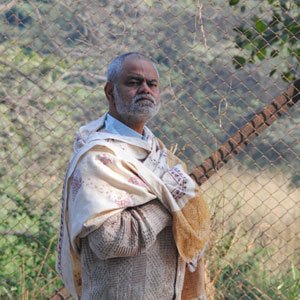Cast: Sanjay Mishra, Rajat Kapoor, Seema Pahwa
Director: Rajat Kapoor
Country: India
Genre: Drama
Editor’s Notes: The following review is part of our coverage of the South Asian International Film Festival, which runs from December 3rd to December 8th. For more information visit saiff.org and follow SAIFF on Twitter at @SouthAsianFilms.
Ankhon Dekhi, the latest film from Rajat Kapoor, begins with a young woman named Rita who confesses that she is falling in love with a man named Ajju. This information does not go down well with her family as Ajju is seen to have a bad reputation, so Rita’s father Bauji gathers them to rush round with the intention of beating him into leaving her alone. When they get there however, Bauji realizes that he is infact “a lamb” and everything that is said about him has been untrue. This leads Bauji on a journey of discovery where he decides to only believe anything that he has experienced first hand with his own senses.
As is to be expected, there are a lot of moments in the film that are lost in translation – literally as well as culturally [...] But there are plenty of instances that give a warm insight into both Indian culture and Indian filmmaking.
This damascene moment starts to get him into trouble in all different areas of his life. He loses his job as he no longer wants to lie to his customers about the distance the flight tickets that he is supposed to be selling them; his wife is upset with him as he no longer prays in the mornings; and he stops reading newspapers as he no longer cares about the unverified information that they contain. After the initial negative response from his friends and family, he acquires a following of disciples who want to learn from his spiritual epiphany, and eventually gives up language itself so that he can “get closer to the essence”.

As is to be expected, there are a lot of moments in the film that are lost in translation – literally as well as culturally. For example, the gender inequality is hard to stomach at times, and the children getting beaten for failing maths is hopefully a character flaw of the uncle and not a widespread societal feature. But there are plenty of instances that give a warm insight into both Indian culture and Indian filmmaking.
The wedding in the film is a beautiful display of joy and vibrant colour, and the food and spices also give the cinematography a rich colour palette. Like all Indian cinema there is plenty of music throughout, but instead of the stereotypical dance displays of Bollywood there are musical interludes reminiscent of folk songs explaining the narrative or mood to give the viewer some space from the frenetic overlapping dialogue.
Bauji’s extreme skepticism has some funny consequences, like when his daughter shouts at him about her wedding arrangements in front of his disciples. When she leaves he claims that she ‘roared like a tiger’, but one of his followers asks him whether he has actually heard a tiger roar, and why should he be sure that they even do. This leads them to spontaneously go to find a tiger so that they can experience in for themselves…
Although at times it is quite funny, the film has a clear message that individual people should find a way of living and thinking that works for them and to, where appropriate, help others to find their own way – a kind of spiritual libertarianism, but applied to all avenues of thought [...]
Although at times it is quite funny, the film has a clear message that individual people should find a way of living and thinking that works for them and to, where appropriate, help others to find their own way – a kind of spiritual libertarianism, but applied to all avenues of thought: a call to extreme spiritual and intellectual freedom instead of an economic and political one. The film is also an overt celebration of families and brotherhood with plenty of moments of poignancy in amidst the apparent dysfunction.
[notification type="star"]70/100 ~ GOOD. Ankhon Dekhi is an overt celebration of families and brotherhood with plenty of moments of poignancy in amidst the apparent dysfunction.[/notification]





